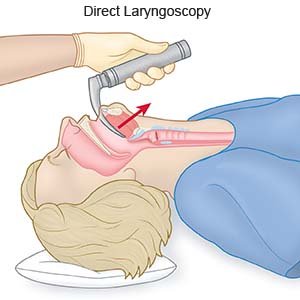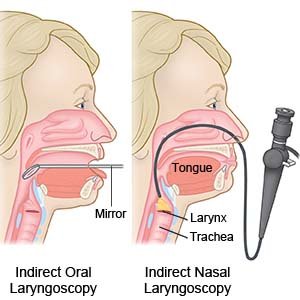Laryngoscopy
Medically reviewed by Drugs.com. Last updated on Apr 2, 2024.
AMBULATORY CARE:
What you need to know about a laryngoscopy:
A laryngoscopy is a procedure used to see inside your throat and larynx (voice box). Your healthcare provider may check for an injury, growth, or other problems. He or she may remove growths or stuck objects, or take tissue samples. Material may be used to build up your vocal cords so they work better. A laryngoscopy may also be used to put in a breathing tube for surgery or after an injury.
How to prepare for a laryngoscopy:
- Tell your provider about any medical conditions you have. Tell him or her if one of your nostrils is plugged or blocked. He or she may ask if you gag easily. Your neck must bend as the scope moves past your teeth and tongue. Tell your healthcare provider if you have problems extending your neck. Tell your healthcare provider if you have dentures, loose teeth, or other dental work.
- Tell your provider about any allergies you have. You may be given local anesthesia to make the procedure more comfortable. You may have general anesthesia to keep you asleep during the procedure. Tell your provider if you have ever had an allergic reaction to local or general anesthesia.
- You may be given medicine that dries the mucus or fluids in your throat. These medicines help healthcare providers see the area better. A numbing medicine may be sprayed on the back of your throat.
- Your healthcare provider will tell you how to prepare. If you are having general anesthesia, your healthcare provider will tell you when you need to stop eating or drinking before the procedure.
What will happen during a laryngoscopy:
- A direct laryngoscopy means your healthcare provider looks directly into your larynx. Your tongue or tissues in your throat will be held out of the way. This procedure may be done to remove an object or growth, or to take a tissue sample.

- An indirect laryngoscopy means your provider uses a mirror to see around your tongue or other tissues. You may be asked to make certain sounds to help your provider watch your larynx and vocal cords move.

- A flexible laryngoscopy means your provider will use a tool called a flexible laryngoscope. This scope has a magnifier and light on the end. The scope is either put into your nostril or into your mouth and guided into your larynx. Pictures are taken of the area and shown on a monitor.
What to expect after a laryngoscopy:
- Local anesthetic or numbing medicine sprayed into your throat should wear off within 30 minutes. You may have a sore throat after the medicine wears off. This is normal and should go away within 2 days.
- Your voice may sound hoarse. This should get better in a few weeks with rest.
- You can eat and drink as usual after the numbing medicine wears off and you can swallow normally. Your healthcare provider will give you directions to follow at home.
Risks of a laryngoscopy:
Your teeth, lips, or tongue may be damaged by the scope. Your throat may close and reopen suddenly (spasm) after the procedure. This can cause short-term problems with breathing or talking.
Call your doctor if:
- You have problems breathing or talking.
- You see new injuries to your teeth, lips, or tongue.
- Your pain does not go away or gets worse after 2 days.
- You still have symptoms such as hoarseness or trouble swallowing 2 weeks after your procedure.
- You have questions about your condition or care.
Relieve a sore throat:
Throat discomfort is normal and should get better within 2 days. Throat lozenges, cough drops, honey, or a warm salt water gargle may help. Mix 1 teaspoon of salt and 1 cup of warm water to make salt water. Gargle for 10 to 15 seconds. You can do this up to 4 times each day, or as directed. Do not give lozenges or cough drops to children younger than 4 years.
Nutrition:
Your healthcare provider may give you instructions on what to eat and drink.
Voice care:
Your voice may sound hoarse after a laryngoscopy. This should get better in a few weeks. Do not shout. Try to rest your voice. Speak softly, but do not whisper. Keep conversations short.
Follow up with your doctor as directed:
If you had a biopsy or other tests, your doctor will tell you when to come back for the results. Write down your questions so you remember to ask them during your visits.
© Copyright Merative 2024 Information is for End User's use only and may not be sold, redistributed or otherwise used for commercial purposes.
The above information is an educational aid only. It is not intended as medical advice for individual conditions or treatments. Talk to your doctor, nurse or pharmacist before following any medical regimen to see if it is safe and effective for you.
Further information
Always consult your healthcare provider to ensure the information displayed on this page applies to your personal circumstances.
